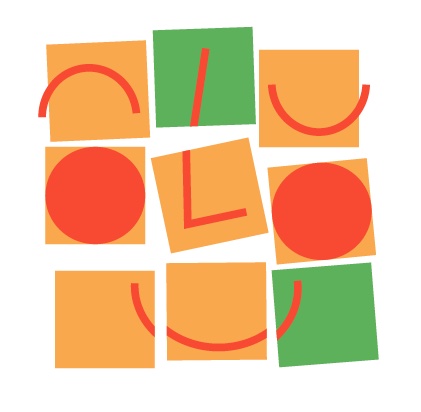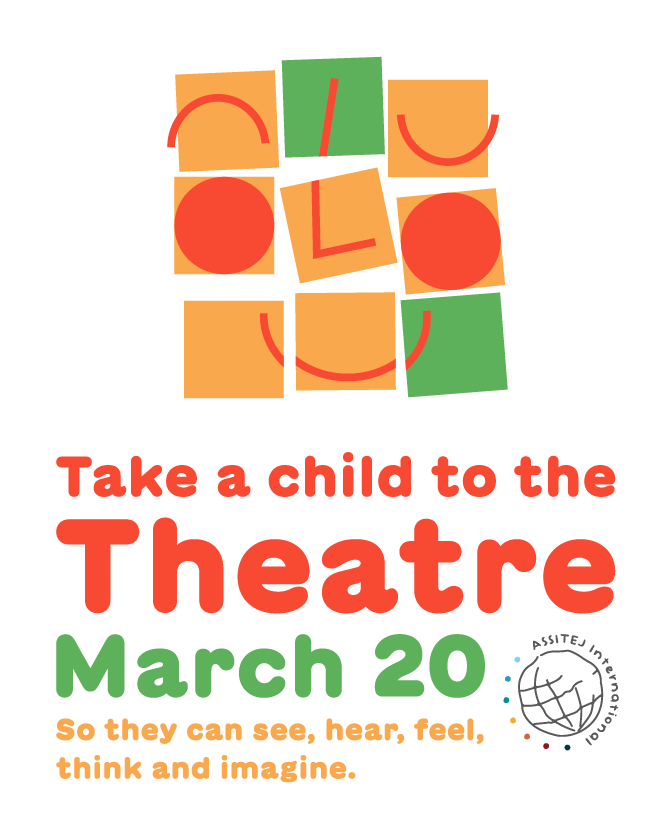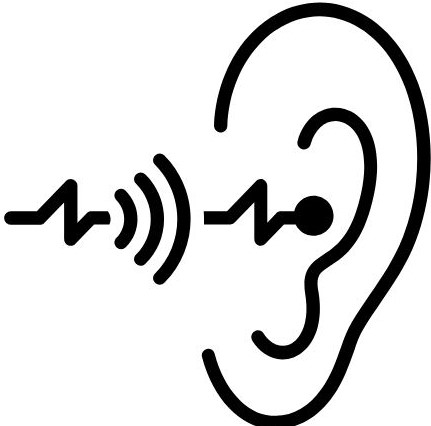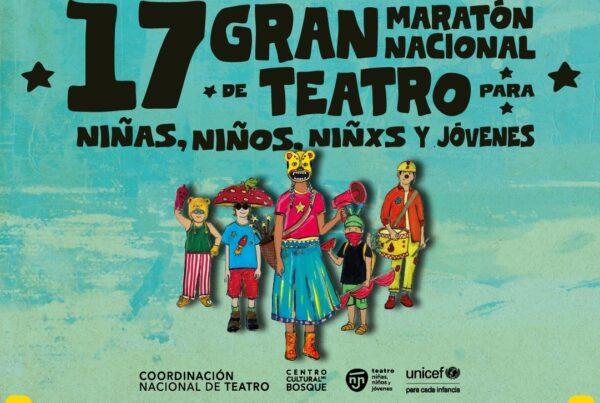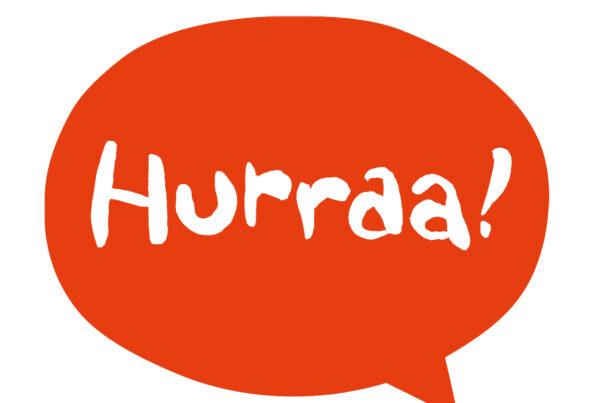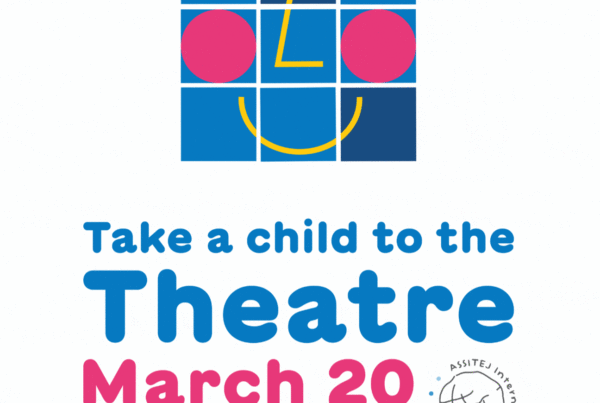ASSITEJ World Day of Theatre for Children and Young People is an ASSITEJ campaign, promoted and celebrated through the message ‘Take a Child to the Theatre, Today’.
This focus enables national centres, individual members, companies, arts organisations, academics, teachers, artists, practitioners and others interested in theatre for young audiences to connect with the idea of world day and ‘make the case’ for children’s entitlement to theatre and the arts.
All ASSITEJ members are invited to promote special world day messages written every year, share the ASSITEJ film and consider additional activity – large or small. Each year ASSITEJ Centres around the globe deliver activities ranging from conferences, performances, workshops and special media events connected to #takeachildtothetheatre.
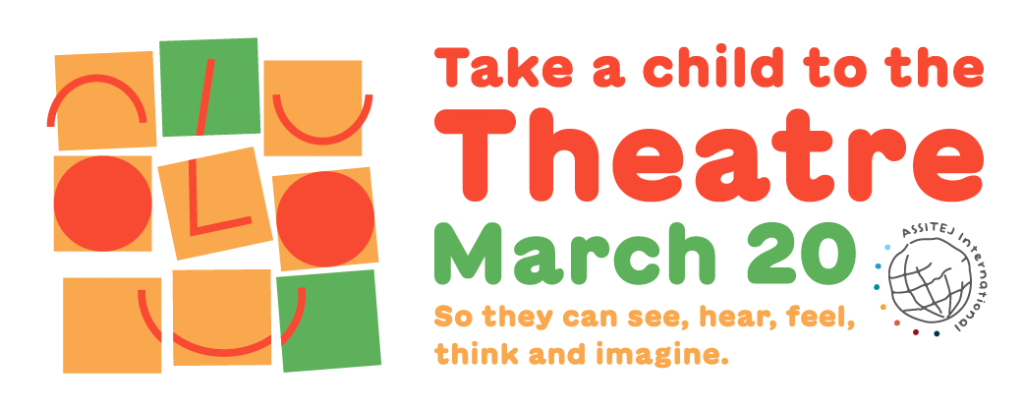
Download the World Theatre Day Logos here.
2023 World Day Message from Sue Giles
President: ASSITEJ International

Take a child to the theatre OR take the theatre to the child!
On March 20th 2023, we recognise the artists in theatre and performance for young audiences as essential workers; making a difference to the lives of children wherever they are and with a deep and specialised knowledge of their audiences. Theatre and performance for young audiences is distinct in its approach; valuing children and young people as discerning audiences, participants and contributors to culture, with the right to experience the arts and to have freedom of expression. Giving space, place and respect to the imaginations of young people gives them foundations on which to build resilience and confidence.
One of the primary aims of ASSITEJ International is to unify practitioners all over the world and to strengthen the possibilities for young audiences everywhere to experience what theatre and performance offers – the expression of emotion, the illustration of the intangible, the interpretation of a complex world. To do this we need to be open to all the diversity of art-making that our global network offers and to celebrate the innovation that comes from limitations, challenges and specific contexts.
Sometimes we cannot take children to the theatre buildings. Sometimes there is no such place. Sometimes physical, economic, geographical or social barriers make it impossible. Yet every time our global community gathers to discuss or share, whether online or in person, we become more aware of the variety of ways artists and creatives make theatre and performance possible for young audiences in their contexts. How wonderful it is, to hear and see so many examples around the world of theatre and performance going to where children and young people are: to their schools, child cares and kindergartens, to the streets, to community spaces, to hospitals, to sports grounds, to prisons, to their houses, to public places, to their computers or phones or radios.
Because of our global connection on line and at our gatherings, we have seen and heard extraordinary stories of struggle, courage and determination and acknowledge all the different forms our creative community uses to reach further, to meet the need and to create greater access.
Theatre and performance makes a difference; human to human contact, the spread of ideas, the sharing of hope, the explosion of joy. No matter whether in a theatre building or in a back alley, the creation of wonder or a shared moment or an intriguing ritual is something that can transform a day, or a life, even momentarily. It’s through theatre and performing arts that we recognize the common ground between us and the horizon becomes wider.
On this World Day of Theatre and Performance for Children and Young People I urge all of us working in this sector to seek out the young audiences that we don’t know and haven’t met yet. Access to theatre and performance is not always shared or possible and so it’s up to us, the specialists in our field, to make it possible, wherever and however we can. We are necessary, in all our contexts, in all our diverse practices, to bridge the gap between reality and imagination and allow possibility to flourish for all children and young people, everywhere.
LEER EN ESPAÑOL > LER EM PORTUGUÊS>
2023 World Day Messages from Ukrainian and Iranian Children
After the pandemic, everything seems to be going back to normal. However, there are still many people, especially children, who continue to suffer from difficult situations around the world such as war and social turbulence. It’s important that we pay attention to their voices and acknowledge how much they love and want theatre and the arts, despite their challenging circumstances.
Here are some messages from children in Ukraine and Iran.
Two Ukrainian children are from Chernihiv, but one of them is currently staying in Poland.
The name of the Iranian girl is assumed due to security reasons.
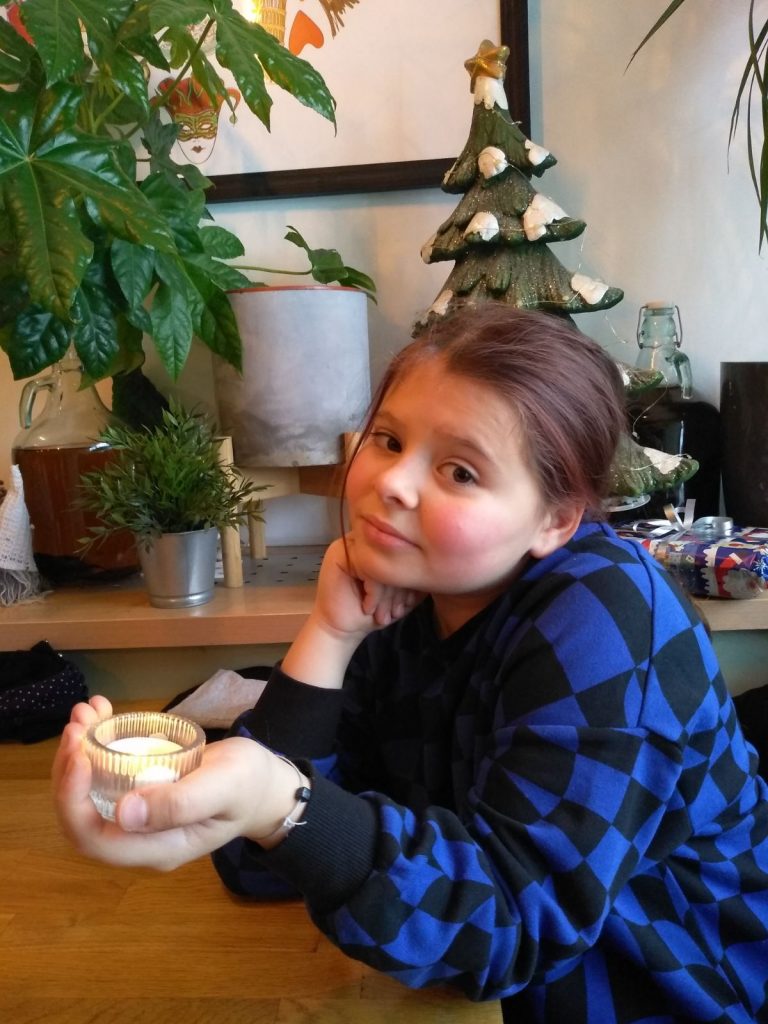
Faina Shyrokorad (Chernihiv, Ukraine, 9 years old).
Theatre was always a part of my life. My mother is an actress. Before February (February 24 2022 – the beginning of a full-scale invasion of Russia) she worked in the theater in Chernihiv. I grew up in the theatre and spent a lot of time there since I was a baby. I also often went to watch different performances in other theaters.
Theatre is actually my childhood full of beautiful bright costumes, scenography, and a lot of interesting stories. I even had a small part in the performance together with my Mum.
I also attended Theatre Class in Chernihiv for some years before war. We were preparing our first big performance – the fairytale “Old Mother Frost”. I had a leading role. I was to perform the stepdaughter. Though we couldn’t complete our work as the war started.
I like theatre very much as I can get into a fairy-tale in a real life. I am an actress when I go to theatre class. I can be anybody! A character from the fairy-tale, for example.
I think that theatre is important. When you are in the theatre you can both laugh and cry. Performances sometimes make you sad. Sometimes shows make you think of important things and you can make your dreams come true with the theater.
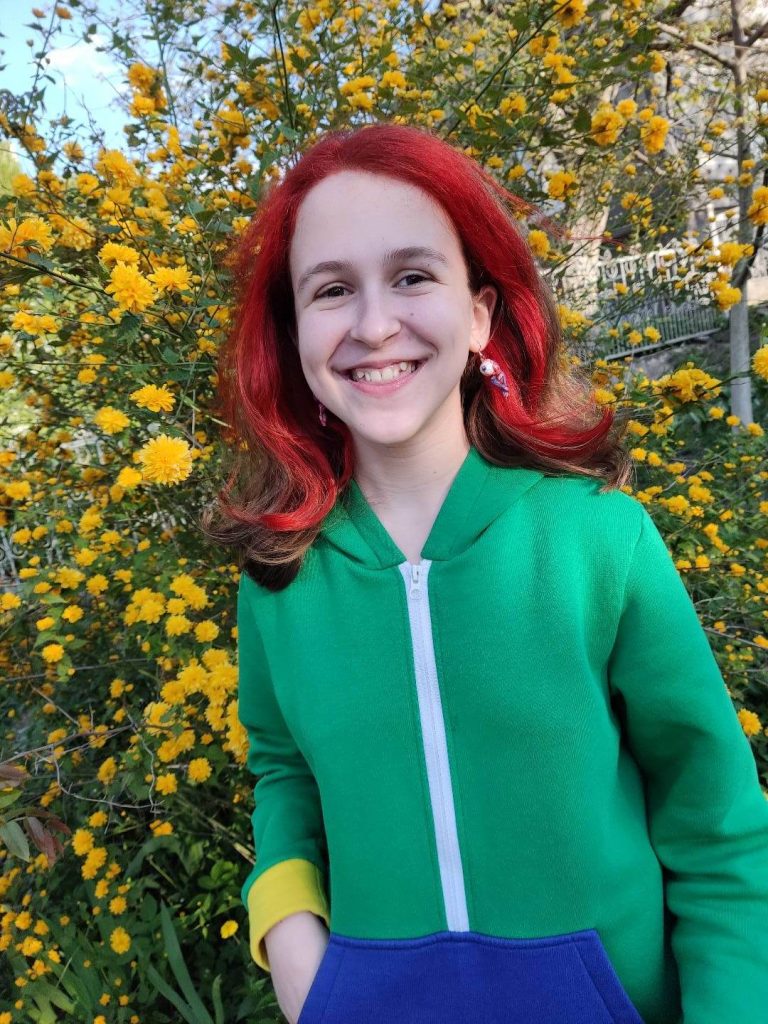
Mariia Drozdova (Chernihiv, Ukraine, 11 years old)
I like theatre very much. I like both to watch performances and to perform myself. I like how people can turn into different characters using emotions, gestures, facial expressions, and acting.
I was a part of Theatre Class in my hometown, Chernihiv, for several years before war. Together with other kids we not only performed, but also made props and designed the scenography. So we basically created everything by ourselves. We made many performances in the past. I had different roles. In the performance “The Blue Bird” I performed together with my elder brother. It was such a fun!
I was supposed to have two absolutely different roles (Dragon and a Robber) in a new show which we were preparing. It was “The Tale of the Knight who didn’t have the Horse”. I was so excited! Unfortunately, we didn’t have a chance to stage it as the war started. Now we don’t have our weekly meetings in the Theatre Class. I miss these classes a lot.
My favorite thing about the theatre is the transformation. Actors can use their voice, movements and become somebody else. I enjoy being an actress so much. I love performing in a new show for the first time. I adore choosing or making costumes.
I believe that theater is a vital issue today. It means that another reality is created and people are inside this reality. It makes them relax sometimes. Though more often theatre makes people think about important life problems.
Nika Rousta (Tehran, Iran, 14 years old)
As a teenager living in this situation in Iran, life is not much fun without theater. Our country is in a special situation, and even though we are only 12-19 year old, we are expected to act like an adult, and when we do grownups shut us down and say you are still too young for this type of stuff.
Even though adults might call us rude but if something is not going our way we are going to change it exactly like what is happening right now in Iran. We are fighting for our freedom and at the same time trying to be a good sibling, child, friend, and person. And if we have something to watch like a theater that makes us feel loved, understood and appreciated is what keeps us going.
As a teenager movies and theaters that make us feel understood is a good medicine and is a good way to escape from reality.
Even though theaters are shutdown right now, watching old ones on the internet is really fun and I think theater is an important side of art and a great way to represent feelings.
I really miss the time that I went to theater with my family and friends. I hope everything gets better and become normal again. I understand why artists are not performing these days.
We expect theater makers who works for teenagers, to understand that we are not adults and not kids. We fight for our rights, we are all going through a lot. Just understand us and love us.
2023 World Day Video
Share your messages on our page!
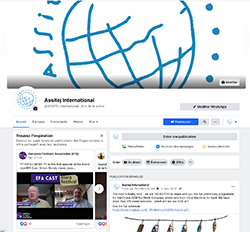
ASSITEJ invites all its members to contribute to the WDT 2023 by giving a voice to children and young people!
Our recipe:
1° Ask a young theatre maker or theatre lover why theatre is important
2° Post his / her response on
https://www.facebook.com/ASSITEJ.International
Remember to use #TakeaChildtotheTheatre
ASSITEJ Fundraising campaign
Some countries use the campaign as a rallying call to ask for donations to ensure that children and young people who otherwise wouldn’t have access to theatre get an opportunity to do so on this day.
Previously, ASSITEJ Italy raised 1400 euros from the campaign through asking audiences to add a small donation to their ticket price. The money was collected and then donated to Jacaranda Theatre Arts Festival Festival in Zambia, and to SAFE (Southern African Festival for Children and Young People) in Zimbabwe, to aid audience access to these events. The determination for the funding was made by ASSITEJ Executive Committee after an open call.
Should you wish to contribute in this way, please contact the Secretary-General of ASSITEJ.
We hope that as many members as possible will get behind the campaign for 2023 so that we can make as big an impact as possible which supports the rights of children and young people to engage with theatre.
International Co-operation
World Performance Week is a concept initiated by ASSITEJ International, in collaboration with other international associations involved with different art forms related to live performance, which celebrate their World Days between March 20th and March 27th.
We invite you to build partnerships with these associations in your own country and to participate in World Performance Week where this is possible. The week includes March 20th, ASSITEJ World Day of Theatre for Children and Young People (and the campaign “Take a Child to the Theatre”), March 21st, UNIMA’s World Puppetry Day, March 22nd, World Mime Organisation’s World Mime Day, and March 27th, ITI’s World Theatre Day, which is also celebrated by other associations, such as IATC, IDEA, AITA/IATA and others. Use the unifying logo, as well as the ASSITEJ International logo and the Take a Child to the Theatre Today logo, if you wish to promote the week.

